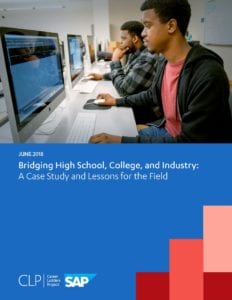A Case Study and Lessons for the Field
 Partnerships among secondary and postsecondary educational institutions and employers that aim to prepare students of diverse backgrounds for college and careers have proven benefits. Evaluations of the California Partnership Academies conducted between 1984 and 2002 show early college students attended high school more regularly, earned more course credits and higher grades,and graduated at higher rates than students not in academies. About a third of early college students earn a credential before they finish high school. Evaluations of California’s Linked Learning initiative demonstrate especially strong outcomes among African American, Latino, and English-language learner students in robust pathway programs.
Partnerships among secondary and postsecondary educational institutions and employers that aim to prepare students of diverse backgrounds for college and careers have proven benefits. Evaluations of the California Partnership Academies conducted between 1984 and 2002 show early college students attended high school more regularly, earned more course credits and higher grades,and graduated at higher rates than students not in academies. About a third of early college students earn a credential before they finish high school. Evaluations of California’s Linked Learning initiative demonstrate especially strong outcomes among African American, Latino, and English-language learner students in robust pathway programs.
This case study prepared by the Career Ladders Project (CLP), the partnership’s capacity-building intermediary, documents successes achieved by the Community of Practice and lessons of potential value to other education and industry partners working to strengthen K–16 career pathways. It draws upon interviews conducted with the Skyline Academy’s founder, current teachers, and pathways coach; BCC faculty and administrators; SAP’s head of Corporate Social Responsibility for North America; and students. The partners hope that these lessons may contribute to a growing body of knowledge about how partnerships such as this one can support more equitable student access to and success in college and careers.
Prepared by Career Ladders Project
June 2018